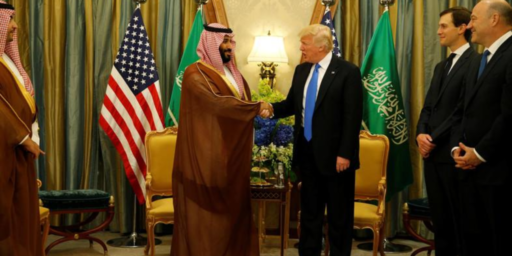Kerry Says Global Democracy Is Not His Top Issue
WaPo — Kerry Says Global Democracy Is Not His Top Issue
Sen. John F. Kerry indicated that as president he would downplay the promotion of democracy as a leading goal in dealing with Pakistan, Saudi Arabia, Egypt, China and Russia, instead focusing on other objectives that he said are more central to the nation’s security.
Kerry, in a one-hour interview Friday night, also rejected the idea of setting a date for the withdrawal of U.S. soldiers from Iraq. Though the notion is gaining favor in more liberal parts of the Democratic Party, the presumptive Democratic presidential nominee said “it is not a good idea just in a vacuum” because the timetable for reducing U.S. troops must be dictated by success in holding elections and establishing security and stability.
In many ways, Kerry laid out a foreign-policy agenda that appeared less idealistic about U.S. aims than President Bush or even former president Bill Clinton, a fellow Democrat. While Kerry said it was important to “sell [democracy] and market it” around the world, he demurred when questioned specifically about a number of important countries that suppress human rights and freedoms. He said securing all nuclear materials in Russia, integrating China in the world economy, achieving greater controls over Pakistan’s nuclear weapons or winning greater cooperation on terrorist financing in Saudi Arabia trumped human rights concerns in those nations.
“Sometimes we are dealt a set of cards that don’t allow us do everything we want to do at once,” he said.
During the interview, he eschewed the soaring rhetoric on freedom and democracy that are commonplace in Bush’s speeches or news conferences. At one point, he stumbled over his words when he tried to emphasize his interest in promoting American values: “The idea of America is, I think proudly and chauvinistically, the best idea that we’ve developed in this world.”
Kerry said that “how fast you can do that [promote democracy overseas] and how rapidly others can embrace it and what can be expected over a period of time varies from place to place.” Emphasizing his interest in setting realistic goals, he added: “Beware of the presidential candidate who just sort of says with a big paint brush we’re going to make everything all right overnight.”
This is interesting, in that it appears Kerry is trying to position himself to the right of President Bush on foreign policy matters—which is probably the place to be. The nation is rightfully skeptical of nation-building; indeed, candidate Bush ran against it in 2000. How this comports with Kerry’s voting record and past statements will be interesting to see; my impression has been that he’s more of an idealist than this position.
I would note, however, that democracy promotion is hardly the biggest priority of the current team. Indeed, we’re eschewing that in Pakistan and Saudi Arabia, to take two prominent examples, instead working with authoritarian regimes in order to achieve security-related goals in the region. The argument for democratization in Iraq isn’t so much humanitarian, although that angle has been played up a lot, but that democracies tend not to fight each other and to be hostile to the sort of religious extremism that we’re fighting in the war on terrorism.




Kerry seems to be proving Jeane Kirkpatrick right. He, at least, is “soft on democracy.”
The most important political distinction among countries concerns not their form of government but their degree of government. The differences between democracy and dictatorship are less than the differences between those countries whose politics embodies consensus, community, legitimacy, organization, effectiveness, [and] stability, and those countries whose politics is deficient in these qualities.
– Samuel Huntington
What the acclaimed political scientist was saying is in a sense extremely un-American, but entirely true. A dictatorship can be more “liberal” (in the classical sense) than a democracy. A dictator — or monarch — can, in principle, protect civil rights and the rule of law as well as a democracy does. Americans are often led to believe that democracy, by definition, protects civil rights. But — speaking solely of the abstraction we call democracy — democracy has absolutely nothing to do with human rights. Under a democracy, 51 percent of the people can vote to pee in the cornflakes of 49 percent of the people (slave-holding states were ruled by tyrannical majorities, after all). In Saudi Arabia, if elections were held tomorrow, it’s entirely likely that the people would vote to keep their system of government unfree. … In other words, if you’re a normal person with normal ambitions, living in a dictatorship isn’t necessarily all that bad. If I were black, I’d certainly rather live in 1980s Chile than 1850s Alabama and, as a Jew, there were lots of “tyrannical” places I’d rather have lived than democratic Germany in the 1930s.
– Jonah Goldberg